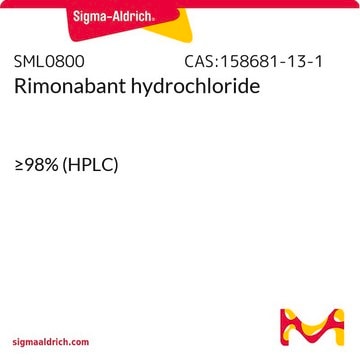SML1899
SR144528
≥98% (HPLC)
Synonym(s):
5-(4-Chloro-3-methylphenyl)-1-[(4-methylphenyl)methyl]-N-[(1S,2S,4R)-1,3,3-trimethylbicyclo[2.2.1]hept-2-yl]-1H-pyrazole-3-carboxamide, SR-144528
About This Item
Recommended Products
Quality Level
Assay
≥98% (HPLC)
form
powder
color
white to beige
solubility
DMSO: 10 mg/mL, clear
storage temp.
−20°C
SMILES string
C[C@]12[C@H](NC(C3=NN(CC4=CC=C(C)C=C4)C(C5=CC=C(Cl)C(C)=C5)=C3)=O)C(C)(C)[C@@H](C2)CC1
InChI
1S/C29H34ClN3O/c1-18-6-8-20(9-7-18)17-33-25(21-10-11-23(30)19(2)14-21)15-24(32-33)26(34)31-27-28(3,4)22-12-13-29(27,5)16-22/h6-11,14-15,22,27H,12-13,16-17H2,1-5H3,(H,31,34)/t22-,27-,29+/m1/s1
InChI key
SUGVYNSRNKFXQM-XRHWURSXSA-N
Application
- to study its blocking effect on the anti-dyskinetic functionality of HU-308
- to study its effects on spontaneous excitatory postsynaptic currents (sEPSCs) from the globus pallidus neurons
- to analyze its effect on the gastric emptying in rats
Biochem/physiol Actions
Storage Class Code
11 - Combustible Solids
WGK
WGK 3
Certificates of Analysis (COA)
Search for Certificates of Analysis (COA) by entering the products Lot/Batch Number. Lot and Batch Numbers can be found on a product’s label following the words ‘Lot’ or ‘Batch’.
Already Own This Product?
Find documentation for the products that you have recently purchased in the Document Library.
Customers Also Viewed
Our team of scientists has experience in all areas of research including Life Science, Material Science, Chemical Synthesis, Chromatography, Analytical and many others.
Contact Technical Service











